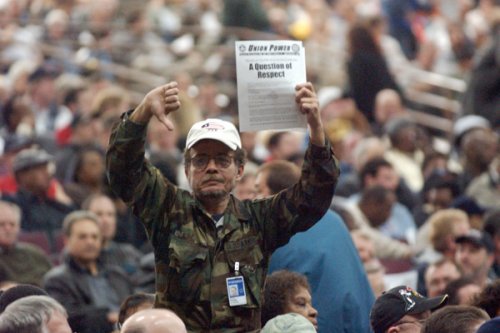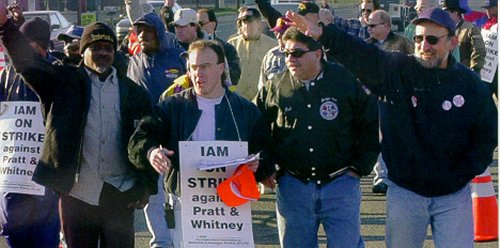| In
contracts with Boieng, Lockheed Martin and other locations this
year, members will demand respect from an industry flush with
profits but rushing to eliminate jobs. |
Return to Contents Page
|

IAM Demands Fair Share of Profits, Job Security
It’s a major contract
year and IAM members are facing an aerospace industry so flush with cash
it’s “an embarrassment of riches.”
Exactly how rich is the industry
right now? Let’s look at the bottom line: their net profits –– the
money they made, free and clear, after paying taxes and all expenses.
The record shows U.S. aerospace companies made more money in the past
six years ($48.3 billion) than they made in the previous 13 years
combined, according to the Aerospace Industry Association.
“All product sectors experienced growth in 2001, from military planes
and satellites to commercial jet engines”, AIA reported. “This marks
the sixth straight year that the industry has earned profits in excess
of $7 billion,” the association observed.
Now the employers must explain at the bargaining table why they
eliminated nearly half the jobs in the industry during the same period
their profits nearly doubled.
The figures tell an ugly tale. Industry profits shot up 94 percent since
1990 (from $4.5 billion to $8.7 billion) while aerospace production jobs
dropped 40 percent (from 430,000 to only 259,000 last year).
Industry apologists argue that business is tailing off, predicting total
sales will fall to $144 billion next year. That “fall” would still
produce the fifth-best year in industry
history.

IAM members at Pratt & Whitney Aircraft kicked off the latest
round of aerospace contracts with an 11-day strike that won tougher job
security protections and other improvements from the Connecticut-based
jet engine company.
IAM Members Fight For Job Security
Connecticut Machinists at Pratt & Whitney jet engines took the
fight for Job Security head on in December, with a successful 11-day
strike that won some of the toughest job protections anywhere.
Pratt & Whitney had eliminated 67 percent of the union jobs in
Connecticut during the past 10 years, violating the contract so brazenly
a federal judge had to order the return of work to IAM-represented
shops.
IAM District 91 launched the forward-looking “Grow Connecticut”
campaign to build broad public support for the creation and preservation
of good paying jobs.
The campaign –– and the strike –– won sympathetic media coverage
and the backing of high-ranking state officials, as well as the general
public.
“We won a mandatory six-months notice before Pratt can move any work
for any reason. We won a joint committee to examine and bring back
out-sourced work. We held onto the contract provisions the judge used to
order the return of work, and we won guarantees that Pratt will build
the F119 jet engine in Connecticut. This was a solid victory,” said
IAM Aerospace Coordinator Gary Allen.
Some 7,200 Lockheed Martin Machinists are also in a major fight for
jobs, with contracts expiring March 1 in Georgia, California and other
locations. The company has eliminated nearly one-third of its IAM jobs
in the past four years.
“The Incredible Shrinking Workforce!” proclaims one union handbill.
“We win the $200 billion Joint Strike Fighter, the biggest military
contract in history, plus we win the F-22. Yet we are told more jobs
will go out the door.”
Lockheed Martin has already announced
that non-union Northrup Grumman will perform 38 percent of the work on
the JSF. British Aerospace will perform 10 percent, leaving Lockheed
Martin with only 52 percent, mainly assembly work.
Still, Lockheed Martin is seeking additional foreign partners to share
work on the taxpayer-financed Joint Strike Fighter.
The biggest contract in IAM aerospace expires September 1 at Boeing
locations in Washington, Kansas and Oregon.
Currently, 27,350 members are covered by the IAM-Boeing contract. It
covered 46,000 members as recently as 1999.
“There are many big issues we need to address at Boeing –– wages,
health insurance and improvements to the pension plan,” said Aerospace
Coordinator Dick Schneider.
“But Job Security is the bottom line for all these issues.
“Boeing is planning the all-new Sonic Cruiser, an airplane they
predict will revolutionize commercial aviation,” Schneider continued.
“But will Boeing’s union work force build that revolutionary
airplane? Will it even be built in America at all?
“This contract could mark a major turning point for America’s
industrial future,” he said.
In contracts with Boeing, Lockheed Martin and other locations this year,
members will demand respect from an industry flush with profits but
rushing to eliminate jobs.
IAM members at Pratt & Whitney Aircraft kicked off the latest round
of aerospace contracts
with an 11-day strike that won tougher job security protections and
other improvements from the Connecticut-based jet engine company.
|